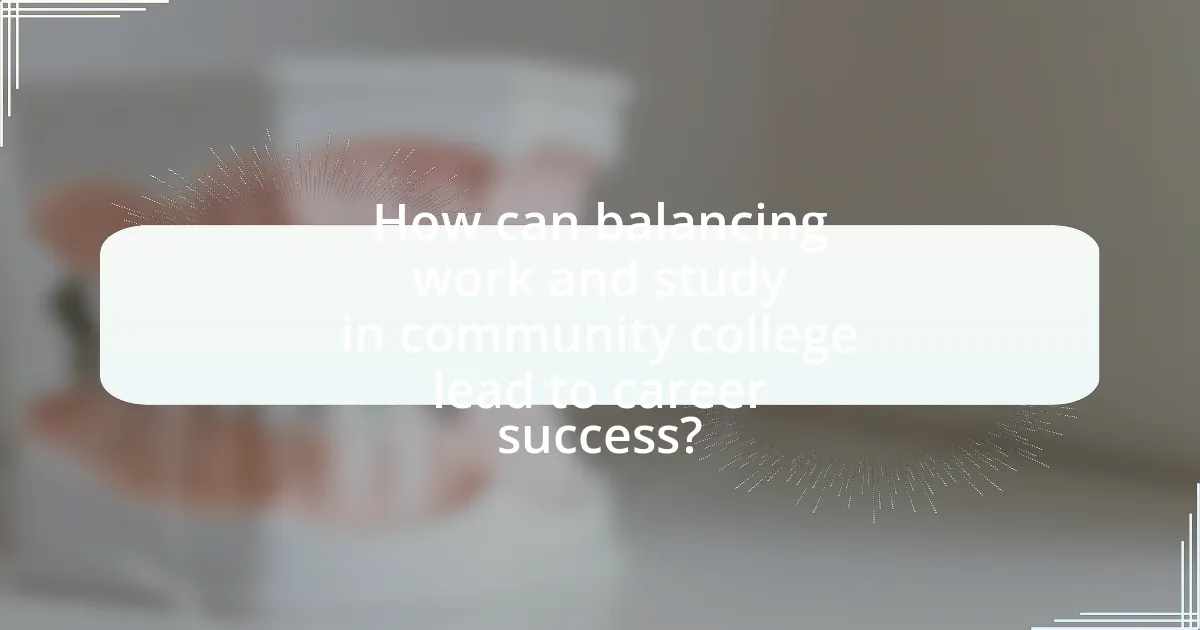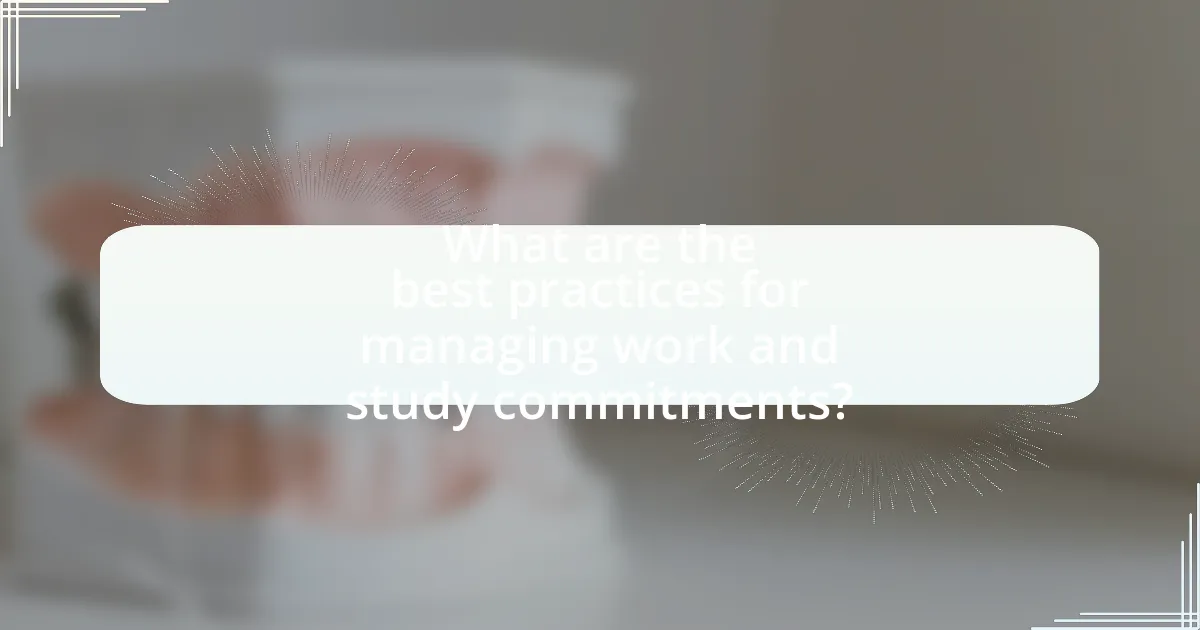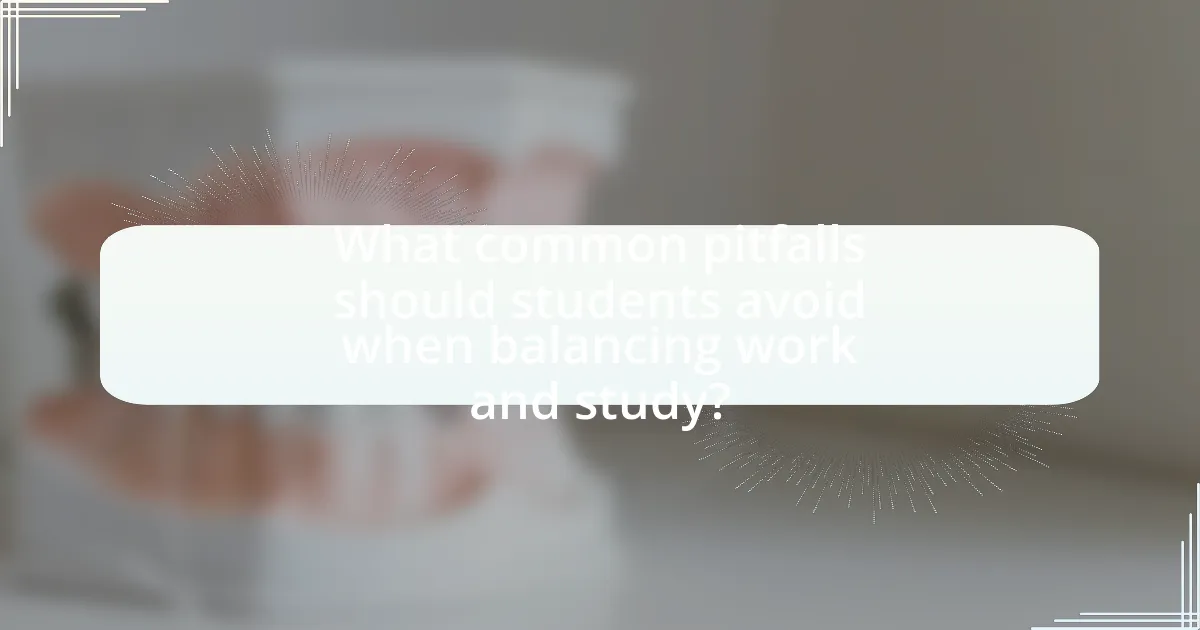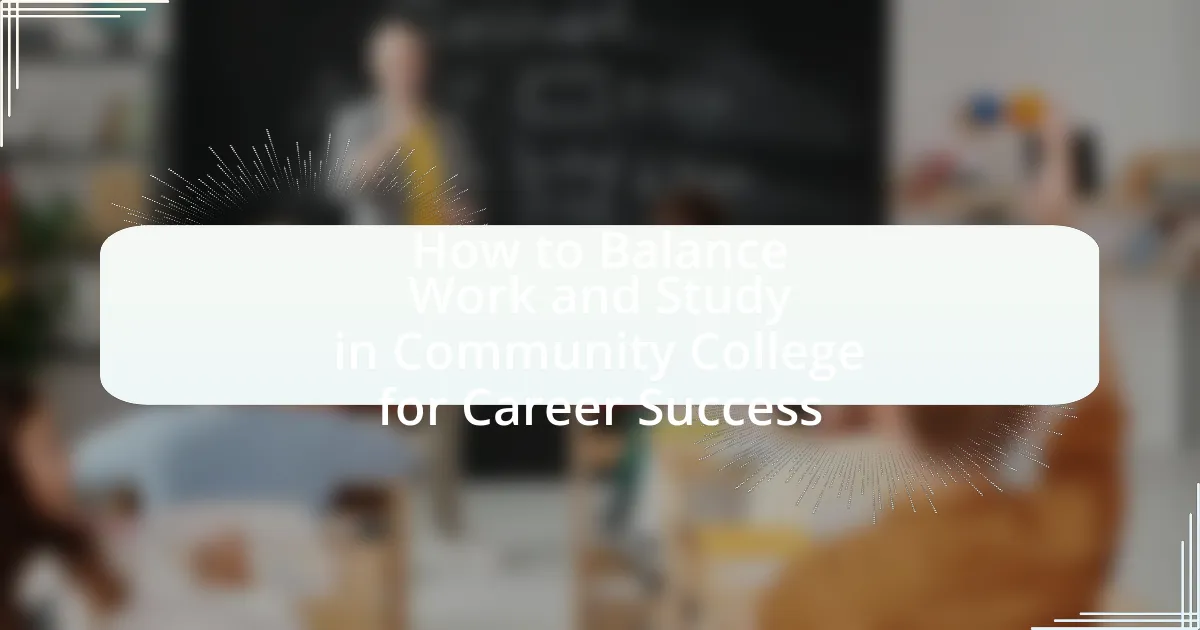The article focuses on the importance of balancing work and study in community college as a pathway to career success. It highlights how effective time management, practical experience, and the development of essential skills can enhance job prospects and satisfaction. Key challenges faced by students, such as stress and financial constraints, are discussed, along with strategies for overcoming these obstacles. The article emphasizes the significance of maintaining a balanced schedule, setting realistic goals, and utilizing digital tools for organization to improve academic performance and overall well-being. Additionally, it addresses the long-term benefits of managing work and study effectively, including increased employability and career advancement opportunities.

How can balancing work and study in community college lead to career success?
Balancing work and study in community college can lead to career success by enhancing time management skills and providing practical experience. Students who manage both responsibilities develop the ability to prioritize tasks effectively, which is a critical skill in any professional environment. Furthermore, working while studying allows students to gain relevant industry experience, making them more attractive to future employers. According to a study by the National Center for Education Statistics, students who work while enrolled in college are more likely to report higher levels of job satisfaction and career advancement. This combination of skills and experience positions graduates for better job opportunities and career growth.
What are the key challenges faced by students balancing work and study?
Students balancing work and study face key challenges such as time management, stress, and financial constraints. Time management issues arise as students struggle to allocate sufficient hours for both academic responsibilities and job commitments, often leading to conflicts in scheduling. Stress is another significant challenge, as juggling multiple roles can result in mental and emotional strain, impacting academic performance and overall well-being. Financial constraints also play a critical role, as many students work to support their education, which can limit their ability to engage fully in their studies and extracurricular activities. According to a study by the National Center for Education Statistics, approximately 70% of undergraduate students work while enrolled, highlighting the prevalence of this issue and the need for effective strategies to manage these challenges.
How do time management issues impact academic performance?
Time management issues negatively impact academic performance by leading to increased stress, lower grades, and decreased retention of information. Students who struggle with managing their time often find themselves overwhelmed by deadlines, resulting in incomplete assignments and poor exam preparation. Research indicates that effective time management correlates with higher academic achievement; for instance, a study published in the Journal of Educational Psychology found that students who utilized time management strategies scored significantly higher on assessments compared to those who did not. This demonstrates that poor time management can hinder a student’s ability to perform academically, ultimately affecting their overall success in community college and future career opportunities.
What role does stress play in balancing work and study?
Stress significantly impacts the ability to balance work and study by influencing time management, focus, and overall well-being. High levels of stress can lead to decreased productivity and motivation, making it challenging for individuals to meet academic and work commitments effectively. Research indicates that students who experience moderate stress may perform better due to heightened focus, while excessive stress can result in burnout and reduced academic performance. For instance, a study published in the Journal of Educational Psychology found that students with manageable stress levels reported higher grades and better time management skills compared to those with chronic stress. Thus, managing stress is crucial for maintaining a healthy balance between work and study, ultimately contributing to career success.
Why is it important to develop a balance between work and study?
Developing a balance between work and study is crucial for maintaining mental health and academic performance. When individuals manage both responsibilities effectively, they can reduce stress and avoid burnout, which is supported by research indicating that students who balance work and study report higher satisfaction and lower anxiety levels. Furthermore, a balanced approach allows for the practical application of academic knowledge in real-world settings, enhancing learning and skill development, as evidenced by studies showing that students who work while studying often perform better academically due to improved time management and organizational skills.
How does a balanced approach enhance learning outcomes?
A balanced approach enhances learning outcomes by integrating academic responsibilities with practical experiences, leading to improved retention and application of knowledge. Research indicates that students who effectively manage their time between work and study report higher levels of engagement and satisfaction, which correlates with better academic performance. For instance, a study published in the Journal of Educational Psychology found that students who balanced work and study demonstrated a 15% increase in GPA compared to those who focused solely on academics. This balance fosters essential skills such as time management and prioritization, which are critical for both academic success and future career endeavors.
What are the long-term career benefits of managing work and study effectively?
Managing work and study effectively leads to enhanced time management skills, which are crucial for long-term career success. Individuals who balance these responsibilities develop the ability to prioritize tasks, meet deadlines, and adapt to changing circumstances, making them more attractive to employers. Research from the National Center for Education Statistics indicates that students who work while studying often report higher levels of engagement and responsibility, traits that are highly valued in the workplace. Furthermore, effective management of work and study fosters resilience and problem-solving abilities, equipping individuals to handle workplace challenges more adeptly. These skills not only improve job performance but also increase opportunities for promotions and career advancement over time.
What strategies can be employed to achieve balance?
To achieve balance between work and study in community college, effective time management strategies should be employed. Prioritizing tasks through a structured schedule allows students to allocate specific time blocks for studying, working, and personal activities. Research indicates that students who utilize planners or digital calendars report higher academic performance and reduced stress levels, as they can visualize their commitments and deadlines. Additionally, setting clear boundaries between work and study time helps maintain focus and prevents burnout, ensuring that both areas receive adequate attention.
How can effective time management techniques improve balance?
Effective time management techniques can significantly improve balance by allowing individuals to allocate their time efficiently between work, study, and personal life. By prioritizing tasks and setting specific goals, students can ensure that they meet academic deadlines while also fulfilling work responsibilities and maintaining personal well-being. Research indicates that students who employ time management strategies, such as creating schedules and breaking tasks into manageable parts, report lower stress levels and higher academic performance. For instance, a study published in the Journal of Educational Psychology found that effective time management is positively correlated with academic success, demonstrating that structured time allocation leads to improved outcomes in both educational and professional settings.
What tools and resources are available to help students manage their schedules?
Students can utilize various tools and resources to effectively manage their schedules, including digital calendar applications, task management software, and academic advising services. Digital calendars like Google Calendar and Microsoft Outlook allow students to organize classes, work commitments, and personal activities in one place, providing reminders and alerts for upcoming events. Task management tools such as Todoist and Trello help students prioritize assignments and track deadlines, enhancing productivity. Additionally, academic advising services offer personalized guidance on course selection and time management strategies, ensuring students can balance their academic and work responsibilities efficiently. These resources collectively support students in maintaining a structured schedule conducive to their success in community college.

What are the best practices for managing work and study commitments?
The best practices for managing work and study commitments include effective time management, prioritization of tasks, and maintaining a balanced schedule. Effective time management involves creating a detailed calendar that allocates specific time slots for work, study, and personal activities, which helps in avoiding last-minute stress and ensures that all commitments are met. Prioritization of tasks is crucial; students should identify urgent and important tasks using methods like the Eisenhower Matrix, which categorizes tasks based on their urgency and importance, allowing for focused efforts on what truly matters. Maintaining a balanced schedule is essential to prevent burnout; incorporating regular breaks and leisure activities can enhance productivity and overall well-being. Research indicates that students who effectively manage their time and prioritize tasks tend to achieve higher academic performance and job satisfaction, as evidenced by a study published in the Journal of Educational Psychology, which found that structured time management practices significantly correlate with academic success.
How can students prioritize their tasks effectively?
Students can prioritize their tasks effectively by using a systematic approach such as the Eisenhower Matrix, which categorizes tasks based on urgency and importance. This method allows students to distinguish between tasks that are critical to their academic and career goals and those that can be postponed or delegated. Research indicates that students who utilize prioritization techniques, like the Eisenhower Matrix, report higher productivity and lower stress levels, as they can focus on what truly matters for their success in balancing work and study.
What methods can be used to create a balanced schedule?
To create a balanced schedule, individuals can utilize time-blocking, prioritization, and regular review methods. Time-blocking involves allocating specific time slots for different activities, ensuring that both work and study commitments are addressed. Prioritization helps in identifying the most important tasks, allowing individuals to focus on high-impact activities first. Regular review of the schedule enables adjustments based on changing responsibilities or deadlines, ensuring ongoing balance. Research indicates that effective time management strategies, such as these, can lead to improved academic performance and reduced stress levels among community college students.
How can setting realistic goals contribute to success?
Setting realistic goals contributes to success by providing clear, achievable benchmarks that guide individuals toward their desired outcomes. When students in community college set specific, measurable, attainable, relevant, and time-bound (SMART) goals, they enhance their focus and motivation, which are critical for balancing work and study. Research indicates that goal-setting can lead to a 20-25% increase in performance, as it helps individuals prioritize tasks and manage their time effectively. This structured approach not only reduces stress but also fosters a sense of accomplishment, reinforcing positive behaviors that lead to further success in both academic and professional settings.
What role does communication play in balancing responsibilities?
Communication is essential in balancing responsibilities as it facilitates clarity, coordination, and collaboration among individuals managing multiple tasks. Effective communication allows students and workers to express their needs, set expectations, and negotiate deadlines, which is crucial in a community college environment where academic and work commitments often overlap. Research indicates that strong communication skills can lead to improved time management and reduced stress, enabling individuals to prioritize tasks effectively and maintain a healthy work-study balance.
How can students communicate their needs to employers and educators?
Students can communicate their needs to employers and educators through clear and direct communication methods such as emails, meetings, and feedback forms. By articulating specific requirements, such as flexible work hours or additional academic support, students can foster understanding and collaboration. Research indicates that effective communication enhances relationships and leads to better outcomes; for instance, a study by the National Center for Education Statistics found that students who actively engage with their educators and employers report higher satisfaction and success rates in balancing work and study.
What are the benefits of seeking support from peers and mentors?
Seeking support from peers and mentors enhances academic performance and personal development. Peers provide a collaborative environment that fosters motivation and accountability, while mentors offer guidance and industry insights that can shape career paths. Research indicates that students who engage with mentors are more likely to achieve their academic goals and develop essential skills, as highlighted in a study by Crisp and Cruz (2009) in the “Review of Educational Research,” which found that mentoring relationships significantly improve student retention and success rates in higher education.
How can students maintain motivation while juggling work and study?
Students can maintain motivation while juggling work and study by setting clear goals and establishing a structured schedule. Clear goals provide direction and purpose, while a structured schedule helps manage time effectively, allowing students to allocate specific periods for study and work. Research indicates that students who set specific, measurable, achievable, relevant, and time-bound (SMART) goals are more likely to stay motivated and achieve academic success. Additionally, utilizing tools such as planners or digital calendars can enhance time management, ensuring that students remain focused on their priorities.
What techniques can help sustain focus and energy levels?
Techniques that can help sustain focus and energy levels include time management strategies, regular physical activity, and mindfulness practices. Time management techniques, such as the Pomodoro Technique, involve working in focused bursts followed by short breaks, which can enhance concentration and prevent burnout. Regular physical activity, supported by research from the American Psychological Association, shows that exercise increases energy levels and cognitive function. Mindfulness practices, such as meditation, have been found to improve attention and reduce stress, as evidenced by studies published in the journal Psychological Science. These techniques collectively contribute to maintaining focus and energy, essential for balancing work and study in community college.
How can celebrating small achievements boost morale?
Celebrating small achievements can significantly boost morale by providing individuals with a sense of accomplishment and motivation. When students or employees acknowledge their progress, even in minor tasks, it reinforces positive behavior and encourages continued effort. Research indicates that recognizing small wins can lead to increased engagement and productivity, as it fosters a positive feedback loop. For instance, a study published in the Journal of Applied Psychology found that employees who received recognition for small accomplishments reported higher job satisfaction and motivation levels. This correlation demonstrates that celebrating small achievements not only uplifts spirits but also enhances overall performance in balancing work and study commitments.

What common pitfalls should students avoid when balancing work and study?
Students should avoid overcommitting to work hours, which can lead to burnout and negatively impact academic performance. Balancing work and study requires careful time management; students often underestimate the time needed for assignments and studying, resulting in poor grades. Additionally, neglecting self-care, such as sleep and nutrition, can diminish focus and productivity. Research indicates that students who prioritize their well-being tend to perform better academically. Lastly, failing to communicate with employers about academic commitments can create conflicts, making it essential for students to set clear boundaries regarding their availability.
What are the signs of burnout in students managing work and study?
Signs of burnout in students managing work and study include chronic fatigue, decreased academic performance, emotional exhaustion, and a sense of detachment from their studies and work. Chronic fatigue manifests as persistent tiredness that does not improve with rest, while decreased academic performance is evident through lower grades and lack of engagement in coursework. Emotional exhaustion can lead to feelings of hopelessness and irritability, and detachment may result in a lack of interest in previously enjoyed activities. Research indicates that approximately 30% of college students experience significant levels of burnout, highlighting the prevalence of this issue among those juggling multiple responsibilities.
How can students recognize when they are overwhelmed?
Students can recognize when they are overwhelmed by identifying specific signs such as increased anxiety, difficulty concentrating, and physical symptoms like fatigue or headaches. Research indicates that these symptoms often manifest when academic and work demands exceed a student’s coping capacity. For instance, a study published in the Journal of Educational Psychology found that students reporting high levels of stress frequently experienced cognitive overload, which hindered their ability to perform effectively in both work and study environments. Recognizing these indicators allows students to take proactive steps to manage their workload and seek support when necessary.
What steps can be taken to prevent burnout?
To prevent burnout, individuals should prioritize self-care, establish boundaries, and manage time effectively. Self-care activities, such as regular exercise, adequate sleep, and healthy eating, have been shown to improve mental health and resilience against stress. Establishing boundaries involves setting limits on work and study hours to ensure personal time is protected, which research indicates can significantly reduce feelings of overwhelm. Effective time management techniques, such as creating a structured schedule and breaking tasks into manageable parts, can help individuals maintain a balanced workload, thereby minimizing the risk of burnout. Studies have demonstrated that students who implement these strategies report lower stress levels and higher academic performance, reinforcing the importance of proactive measures in preventing burnout.
How can procrastination affect academic and work performance?
Procrastination negatively impacts academic and work performance by leading to decreased productivity and increased stress. When individuals delay tasks, they often face tighter deadlines, which can result in lower quality work and missed opportunities for learning and growth. Research indicates that students who procrastinate tend to have lower grades; a study published in the Journal of Educational Psychology found that procrastination is significantly correlated with lower academic performance, as it disrupts effective time management and study habits. In the workplace, procrastination can lead to missed deadlines and reduced job effectiveness, ultimately affecting career advancement and job satisfaction.
What strategies can help combat procrastination?
To combat procrastination, individuals can implement time management techniques such as the Pomodoro Technique, which involves working for 25 minutes followed by a 5-minute break. This method enhances focus and reduces burnout, making tasks feel more manageable. Research by Francesco Cirillo, the creator of the Pomodoro Technique, indicates that breaking work into intervals can significantly improve productivity and concentration. Additionally, setting specific, achievable goals and deadlines can create a sense of urgency, further motivating individuals to complete tasks promptly.
How can students create accountability to stay on track?
Students can create accountability to stay on track by establishing clear goals and regularly sharing their progress with peers or mentors. Setting specific, measurable, achievable, relevant, and time-bound (SMART) goals helps students define what they need to accomplish. Research indicates that students who engage in peer accountability, such as study groups or accountability partners, are more likely to stay committed to their academic objectives. A study published in the Journal of Educational Psychology found that students who reported sharing their goals with others experienced increased motivation and improved academic performance.
What are the consequences of poor time management?
Poor time management leads to increased stress and decreased productivity. Individuals who struggle with managing their time often miss deadlines, resulting in lower academic performance and potential job loss. Research indicates that students with poor time management skills are more likely to experience anxiety and lower grades, as they fail to allocate sufficient time for studying and completing assignments. Additionally, ineffective time management can lead to a lack of work-life balance, causing burnout and negatively impacting both personal and professional relationships.
How can missed deadlines impact academic and professional opportunities?
Missed deadlines can significantly hinder academic and professional opportunities by affecting grades, reputation, and future prospects. In an academic setting, failing to meet deadlines often results in lower grades, which can impact overall GPA and academic standing. For instance, a study by the National Center for Education Statistics indicates that students with lower GPAs are less likely to graduate on time, limiting their career options.
Professionally, missed deadlines can damage an individual’s reputation, leading to a loss of trust from peers and supervisors. According to a survey by CareerBuilder, 58% of employers consider missed deadlines a critical factor in performance evaluations. This can result in fewer promotions, reduced job security, and limited networking opportunities. Overall, the consequences of missed deadlines can create a cycle of academic and professional setbacks that are difficult to overcome.
What are effective ways to recover from time management mistakes?
To recover from time management mistakes, individuals should first assess their priorities and create a revised schedule that reflects realistic goals. This involves identifying tasks that require immediate attention and reallocating time to ensure critical deadlines are met. Research indicates that using tools like the Eisenhower Matrix can help prioritize tasks effectively, allowing individuals to distinguish between urgent and important activities. Additionally, reflecting on past mistakes to understand their causes can prevent future errors, as studies show that self-reflection enhances learning and time management skills. Implementing time-blocking techniques can also improve focus and productivity, as it allows individuals to dedicate specific periods to particular tasks, minimizing distractions and enhancing efficiency.
What practical tips can help students balance work and study effectively?
To balance work and study effectively, students should prioritize time management by creating a structured schedule that allocates specific time blocks for studying, working, and personal activities. Research indicates that students who use planners or digital calendars to organize their tasks report higher academic performance and lower stress levels. Additionally, setting clear goals for both work and study can enhance focus and motivation, as studies show that goal-setting improves productivity. Furthermore, students should communicate with employers about their academic commitments to negotiate flexible work hours, which can lead to a more manageable workload. Lastly, utilizing campus resources such as tutoring services and study groups can provide academic support, making it easier to maintain a balance between work and study.
How can creating a daily routine enhance productivity?
Creating a daily routine enhances productivity by providing structure and consistency, which helps individuals manage their time effectively. When a routine is established, it allows for prioritization of tasks, reducing decision fatigue and enabling focused work periods. Research indicates that individuals with structured routines report higher levels of productivity and lower stress levels, as they can allocate specific times for studying, working, and personal activities. For instance, a study published in the Journal of Applied Psychology found that time management practices, including daily routines, significantly improve academic performance and overall efficiency.
What are the benefits of using digital tools for organization?
Using digital tools for organization enhances efficiency and productivity in managing tasks and schedules. These tools streamline workflows by allowing users to create to-do lists, set reminders, and track deadlines, which is crucial for balancing work and study commitments in community college. Research indicates that students who utilize digital organizational tools report improved time management skills and reduced stress levels, leading to better academic performance. For instance, a study published in the Journal of Educational Psychology found that students who used digital planners were 30% more likely to meet their deadlines compared to those who relied on traditional methods.

Leave a Reply